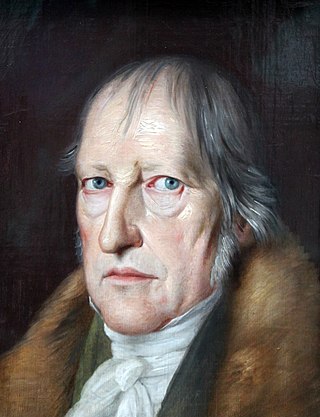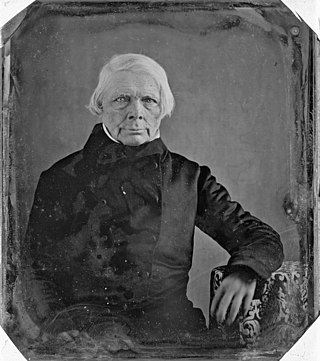
Georg Wilhelm Friedrich Hegel was a German philosopher and one of the most influential figures of German idealism and 19th-century philosophy. His influence extends across the entire range of contemporary philosophical topics, from metaphysical issues in epistemology and ontology, to political philosophy, the philosophy of history, philosophy of art, philosophy of religion, and the history of philosophy.
Dialectic, also known as the dialectical method, refers originally to dialogue between people holding different points of view about a subject but wishing to arrive at the truth through reasoned argumentation. Dialectic resembles debate, but the concept excludes subjective elements such as emotional appeal and rhetoric. It has its origins in ancient philosophy and continued to be developed in the Middle Ages.

Friedrich Wilhelm Joseph Schelling, later von Schelling, was a German philosopher. Standard histories of philosophy make him the midpoint in the development of German idealism, situating him between Johann Gottlieb Fichte, his mentor in his early years, and Georg Wilhelm Friedrich Hegel, his one-time university roommate, early friend, and later rival. Interpreting Schelling's philosophy is regarded as difficult because of its evolving nature.

Johann Eduard Erdmann was a German religious pastor, historian of philosophy, and philosopher of religion, of which he wrote on the mediation of faith and knowledge. He was known to be a follower of Friedrich Schleiermacher, whom he studied under August Carlblom (1797-1877), and Georg Wilhelm Friedrich Hegel, whom he regarded as his mentor. Erdmann also studied the works of Karl Daub. Historians of philosophy usually include Erdmann as a member of the Right Wing of the Hegelian movement, a group of thinkers who were also referred to variously as the Right Hegelians (Rechtshegelianer), the Hegelian Right, and/or as the Old Hegelians (Althegelianer).
Gotthard Günther was a German (Prussian) philosopher.

Wilhelm Dilthey was a German historian, psychologist, sociologist, and hermeneutic philosopher, who held G. W. F. Hegel's Chair in Philosophy at the University of Berlin. As a polymathic philosopher, working in a modern research university, Dilthey's research interests revolved around questions of scientific methodology, historical evidence and history's status as a science. He could be considered an empiricist, in contrast to the idealism prevalent in Germany at the time, but his account of what constitutes the empirical and experiential differs from British empiricism and positivism in its central epistemological and ontological assumptions, which are drawn from German literary and philosophical traditions.

Absolute idealism is chiefly associated with Friedrich Schelling and G. W. F. Hegel, both of whom were German idealist philosophers in the 19th century. The label has also been attached to others such as Josiah Royce, an American philosopher who was greatly influenced by Hegel's work, and the British idealists.

Lectures on the Philosophy of History, also translated as Lectures on the Philosophy of World History, is a major work by Georg Wilhelm Friedrich Hegel (1770–1831), originally given as lectures at the University of Berlin in 1822, 1828, and 1830. It presents world history in terms of the Hegelian philosophy in order to show that history follows the dictates of reason and that the natural progress of history is due to the outworking of absolute spirit.

Gottlieb Christoph Adolf von Harless, was a German Lutheran theologian.

Naturphilosophie is a term used in English-language philosophy to identify a current in the philosophical tradition of German idealism, as applied to the study of nature in the earlier 19th century. German speakers use the clearer term Romantische Naturphilosophie, the philosophy of nature developed at the time of the founding of German Romanticism. It is particularly associated with the philosophical work of Friedrich Wilhelm Joseph Schelling and Georg Wilhelm Friedrich Hegel—though it has some clear precursors also. More particularly it is identified with some of the initial works of Schelling during the period 1797–9, in reaction to the views of Fichte, and subsequent developments from Schelling's position. Always controversial, some of Schelling's ideas in this direction are still considered of philosophical interest, even if the subsequent development of experimental natural science had a destructive impact on the credibility of the theories of his followers in Naturphilosophie.

Adolf Lasson was a German Jewish philosophical writer, strident Prussianist, and the father of Georg Lasson.

The following list of works by German philosopher Georg Wilhelm Friedrich Hegel (1770–1831).

Gottfried Thomasius was a German Lutheran theologian. He was born in Egenhausen and he died in Erlangen.

Georg Wilhelm Friedrich Hegel's Lectures on the Philosophy of Religion outlines his ideas on Christianity as a form of self-consciousness. They represent the final and in some ways the decisive element of his philosophical system. In light of his distinctive philosophical approach, using a method that is dialectical and historical, Hegel offers a radical reinterpretation of the meaning of Christianity and its characteristic doctrines. The approach taken in these lectures is to some extent prefigured in Hegel's first published book, The Phenomenology of Spirit (1807).

Andreas Dorschel is a German philosopher. Since 2002, he has been professor of aesthetics and head of the Institute for Music Aesthetics at the University of the Arts Graz (Austria).

Alois Emanuel Biedermann was a Swiss Protestant theologian. He was a prominent dogmatician of the so-called "Young Hegelian" school of thought, and an important advocate of "free Christianity" in Switzerland.
Erich Schaeder was a German Protestant theologian.
Anton Friedrich Ludwig Pelt was a German Protestant theologian.
Günter Mayer was a German cultural academic and musicologist.
Adolf Friedrich Rutenberg was a German geography teacher, Young Hegelian and journalist. He was a close friend of German philosophers Karl Marx and Max Stirner. He was alongside Bruno Bauer as one of two reported mourners at Stirner's graveside.











